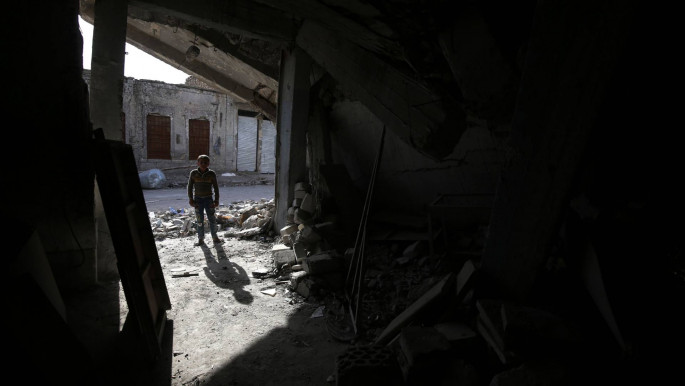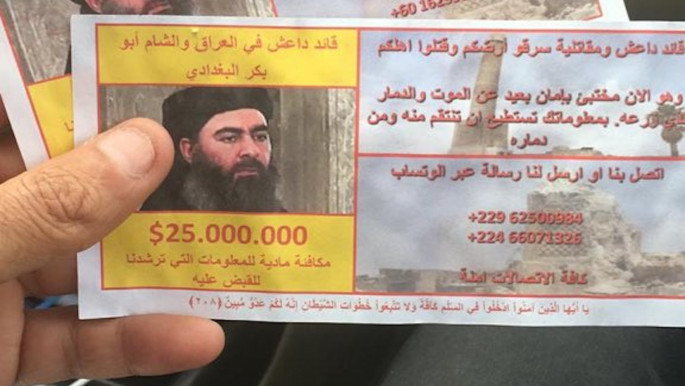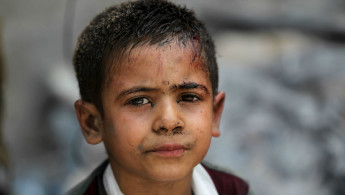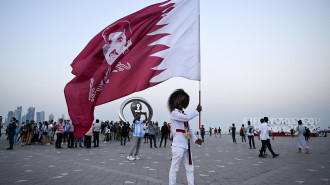The Iraq Report: Almost 800,000 Iraqi children orphaned
Iraq is at very high risk of having yet another "lost generation" as the United Nation's children's charity, UNICEF, revealed that close to 800,000 Iraqi children had lost one or both parents as a result of the continuing instability, chaos, and incessant violence that has wracked Iraq since the country was invaded and occupied by US-led western forces in 2003.
A combination of state-sponsored violence and terrorist activity has meant Iraqi children face unacceptable risks to their long-term wellbeing and, as the future generation, this will have a compounding effect on the entire country.
Meanwhile, Iraqis who campaign against these harsh realities and other issues face arrest, beatings and humiliation at the hands of security forces loyal to politicians who will not tolerate criticism. Blogging against a local city councillor or MP could draw unwanted attention to the social media activist leading to their arrest and torture.
When legitimate, legal and public criticism and expression of opinions regarding problems affecting all Iraqis are discouraged through violence by the state, those problems will not only likely be exacerbated further, but public activism will be forced underground and could become susceptible to extremism.
UNICEF: Many children orphaned and abandoned
The New Arab's Arabic-language service reported on Friday that charities including UNICEF have stated that the number of Iraqi children who had been abandoned or orphaned had now risen to almost one million.*
According to the international charity, an estimated 4.3 percent of Iraqi children had lost one or both parents, totalling to 765,208 children. Other reports have suggested the number of abandoned children could be significantly higher, potentially affecting millions of children.
In a country of 38 million people, many of whom are children and youth, this represents a catastrophic figure that will have negative consequences for Iraq as a whole.
 |
|
| Read also: The Iraq Report: Thousands of children tortured by Iraqi authorities |
Since the United States led an invasion of Iraq in 2003, violence in Iraq has spiralled out of control, with sectarian death squads, Shia militias, and groups like the Islamic State group [IS] each contributing to the calamity faced by Iraqi children.
Both the federal government in Baghdad and the Kurdistan Regional Government in Erbil have done little to help the children under their care, and may have in fact made their situation worse by using disproportionate violence in dealing with terror threats.
In the past few months alone, rights monitors such as Human Rights Watch [HRW] have reported on children being stripped of their rights by being forcibly removed from their families, tortured into confessing to IS membership, and then sentenced to lengthy jail terms. Now reports are revealing an unacceptably large number of children have been abandoned as a result of the ongoing fighting or else were orphaned after their parents were killed either by government-aligned forces and Shia militias, or by IS fighters.
The New Arab spoke to one such affected family in Iraq's northern Diyala governorate. Hanan, 14-years-old, is now living with her paternal grandmother along with her three siblings after her mother was forced to abandon her following her father's death at the hands of IS. Hanan's mother could not support her children and, like many widowed women, sought security by remarrying. Often, however, new husbands are unwilling to take on their new wife's children, leading them to being left with other relatives or even abandoned entirely.
Hanan's grandmother complained that her late son's pension and the compensatory amount paid to victims of the war against IS was not being paid by the government and that she was too old and too poor to be able to afford legal support in claiming her rights. As such, she is left with little to be able to look after her grandchildren with.
The story of Hanan and her family tallies up with The New Arab's reporting last week that showed Iraqis were forced to lie about the cause of death of their relatives so as to be able to rapidly access much needed compensation. Rather than stating the true cause of death – which resulted from the US-led coalition or Iraqi government action – family members felt forced to simply state that their relatives died as a result of "terrorism", exaggerating IS' official civilian death toll while underplaying that of the government and the international coalition.
Activists arrested, beaten and humiliated
The New Arab reported on Thursday that cities across northern and western Iraq had seen a marked increase in arrests of rights activists and critics over the past few weeks. These arrests came following public criticism of local officials and politicians, with some activists reporting suffering beatings and subjected to humiliating acts as punishment.
 |
|
| Read also: Exclusive: US warplanes drop $25-million reward leaflets for Abu Bakr al-Baghdadi's head |
One activist, Mohammed Jasim, was arrested "hours" after he posted against the local authorities on Facebook. A security source told The New Arab that Jasim's home was raided and he was taken into custody and subsequently released on Wednesday on bail pending trial.
Jasim had posted photographs of his local town, showing it in a poor state of repair, flooded, dirty and dilapidated. He also criticised the district council leader for not discharging his duties in maintaining the district.
In a statement following his release, Jasim said that security forces took him immediately to a local prison near Habbaniyah in Iraq's western Anbar governorate. "I was punished by security officials who shaved my head to grade zero as soon as I was arrested and before putting me before the investigative judge," Jasim said after being released.
Ziyad Hamid, an Iraqi human rights campaigner, criticised the authorities and said their actions were similar to the former Baathist regime led by Saddam Hussein.
"This reminds us of the punishments of the old Iraqi regime as back then [Saddam's son] Uday Hussein would order for the heads of the Iraqi national football team to be shaved to grade zero whenever they lost a match," Hamid told The New Arab.
Other activists were reported as having been arrested before being beaten and threatened before release.
It is part of a functioning democratic society to be able to freely express discontent with their political representatives and government officials responsible for various aspects of their lives. If social media posts result in beatings, humiliation and harassment, it may force such moderate dissent underground where it could morph into something altogether quite dangerous or be exploited by groups seeking to drive an even greater wedge between the government and its citizens.
Saudi goes on Iraqi charm offensive
Saudi Arabia's trade minister announced a $1 billion aid and investment package for Iraq during a visit to Baghdad on Thursday, pledging stronger bilateral ties as the kingdom competes with rival Iran for influence over Iraq.
Saudi Trade Minister Majed al-Qasabi also inaugurated a new Saudi consulate in Baghdad, one of four planned branches to open in Iraq after decades of no diplomatic links between the two countries after former President Saddam Hussein invaded Kuwait triggering the Gulf War in 1990.
Although diplomatic relations were restored in 2016, Riyadh's diplomats were recalled after they were critical of Iranian influence in Iraq, particularly within hardline sectarian Shia groups. This led to anger in Baghdad and caused yet another breakdown in relations.
Speaking to reporters alongside Iraqi Oil Minister Thamer Ghadban, Qasabi said the relationship between the two neighbouring states had now entered "a new phase."
Saudi Arabia would provide Iraq with $1 billion in loans for development projects, said Qasabi, plus $500 million to boost exports and a "gift" of a 100,000-seat sports stadium to be built on Baghdad's outskirts.
 |
Saudi Arabia's trade minister announced a $1 billion aid and investment package for Iraq during a visit to Baghdad on Thursday, pledging stronger bilateral ties as the kingdom competes with rival Iran for influence over Iraq |  |
A joint Saudi-Iraq business council also proposed dozens of opportunities in Iraq for Saudi private investors and a free trade zone along the desert border between the two countries, he said.
Iraq is caught in a tug-of-war over influence pitting Iran against the United States and Saudi Arabia. Iran is the second-largest supplier of imported goods to Iraq and also has deep-rooted political and military influence in the country, particularly over Shia parties and sectarian militants.
But Tehran's top foes Riyadh and Washington are seeking to increase their sway in Baghdad, including through trade. Last year, Washington urged Baghdad to partner with US firms instead of relying on Iranian gas and electricity, key crutches for Iraq's faltering power sector.
Riyadh, too, has looked into providing electricity to Iraq through solar power and hosted Iraqi President Barham Salih last year, a major step in the bilateral relationship.
Iraqis had to travel to neighbouring Jordan to apply for a Saudi visa, particularly for major Islamic religious observances such as Hajj and Umrah, until the consulate opening on Thursday.
"Today, our brothers in Iraq can acquire a visa in Baghdad directly, without having to suffer a trip abroad," Qasabi said outside the consulate.
Considering previous Saudi attempts to charm Iraqi politicians away from Iran's orbit, it is unlikely that this latest effort will bear fruit. Both Riyadh and Washington underestimate Iran's influence which extends beyond economic favours and is heavily predicated upon not only a shared religious vision, but a Shia Islamist political ideology that stems from that religious connection and the Islamic Republic of Iran's founder Ayatollah Ruhollah Khomeini.
Both the United States and Saudi Arabia have nothing similar to offer Iraqi policymakers who will happily take their investments and money but will retain their ultimate loyalty with Iran.
The Iraq Report is a weekly feature at The New Arab.



